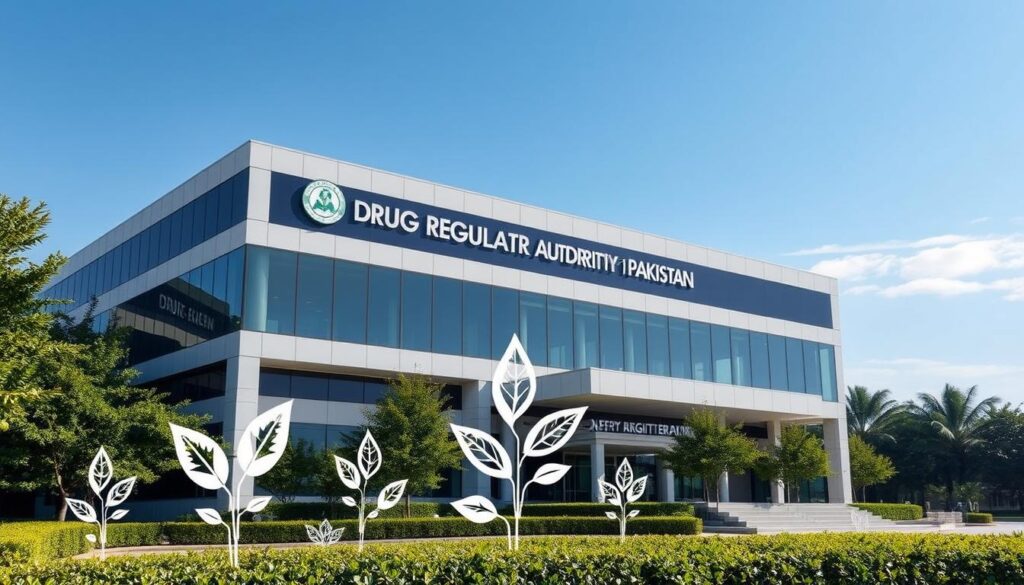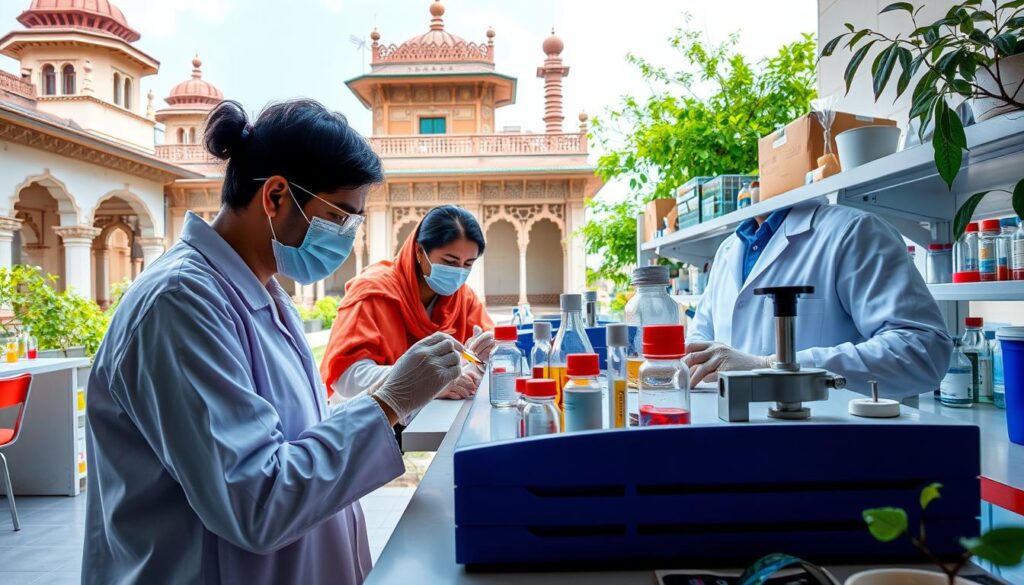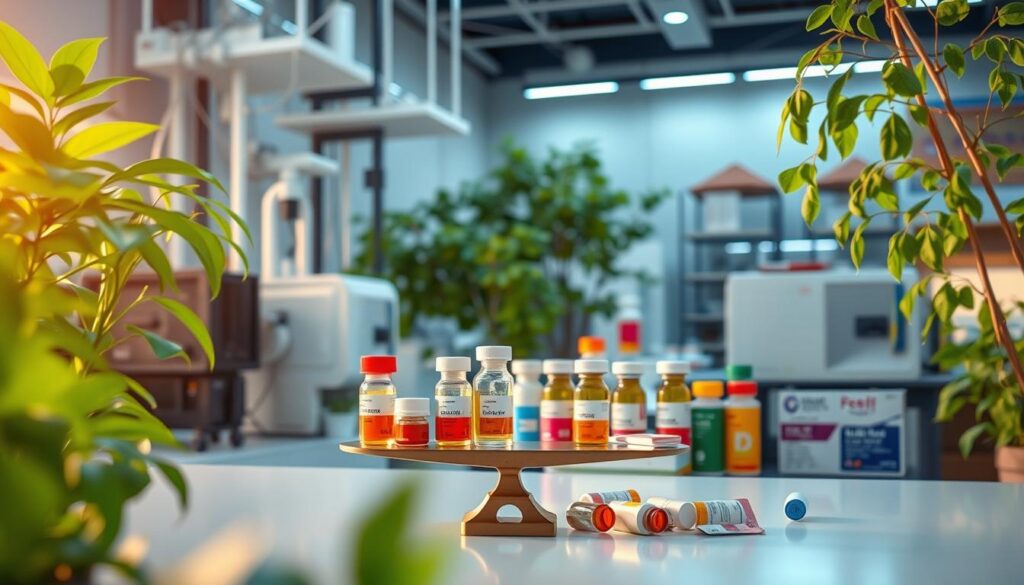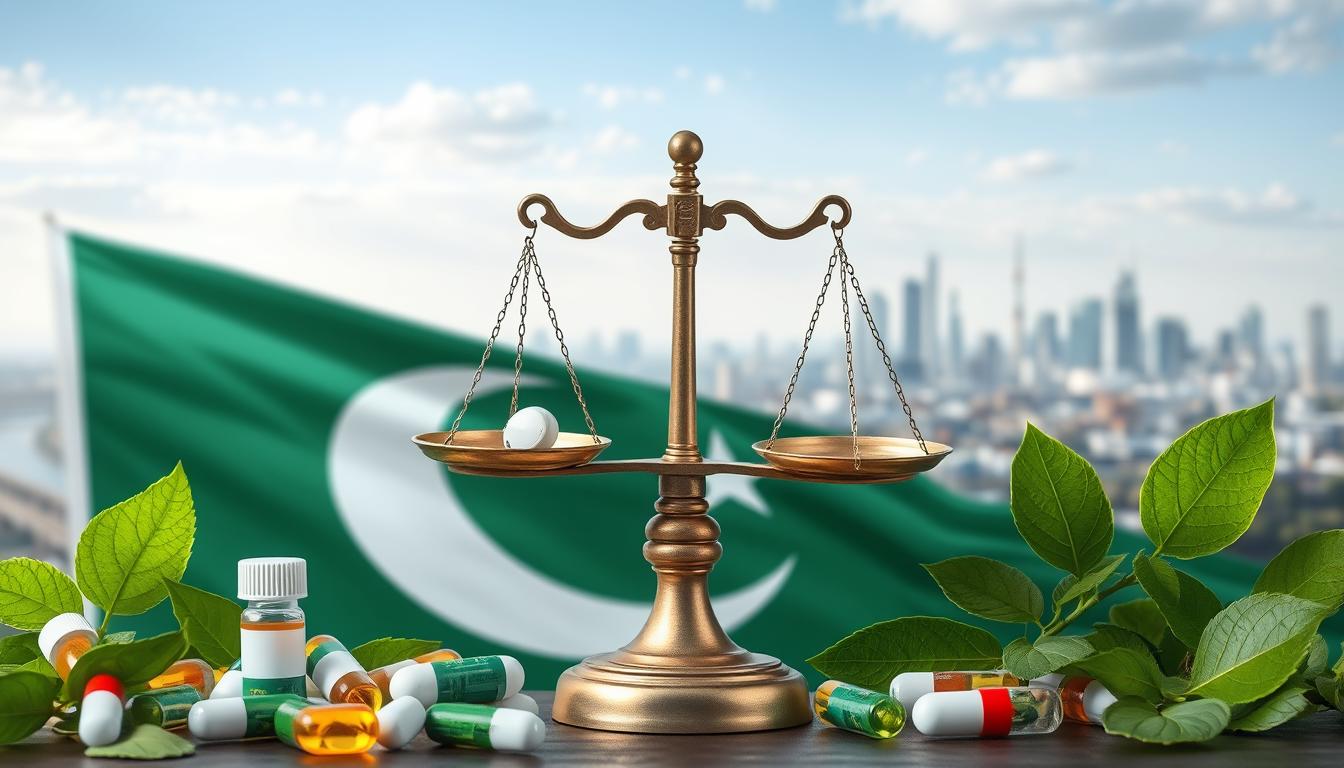Pharmaceutical regulation in Pakistan is taking a dynamic turn. The pharmaceutical industry in Pakistan is key to making medicines affordable and safe. This article looks at how regulation in the country is changing. It focuses on finding a balance between keeping people healthy and helping the industry grow.
It talks about the main regulatory bodies, like the Drug Regulatory Authority of Pakistan (DRAP). It also covers how they ensure medicines are safe and meet quality standards.
The article also looks at what the government is doing to help the industry. They want to make it easier to get medicines approved while keeping everything safe. This way, Pakistan hopes to give its people good healthcare and help its pharmaceutical sector grow.
Key Takeaways
- The pharmaceutical industry in Pakistan plays a vital role in ensuring access to affordable and safe medicines.
- The article explores the evolving landscape of pharmaceutical regulation, focusing on the balance between public health and industry growth.
- It examines the key regulatory bodies, such as DRAP, and their historical development, as well as measures to ensure drug safety and compliance.
- The article delves into the government’s efforts to incentivize manufacturing and streamline the drug approval process.
- The goal is to provide quality healthcare solutions while supporting the growth and innovation of the pharmaceutical sector.
The Evolving Landscape of Drug Laws in Pakistan
In recent years, Pakistan’s drug laws have changed a lot. In 2012, the Drug Regulatory Authority of Pakistan (DRAP) was set up. It is now the main body for the country’s drug industry.
This agency works to make the process of registering and licensing drugs better. It also checks the quality of these products. Before, the system was split up, but now it’s more organized.
Key Regulatory Bodies: Drug Regulatory Authority of Pakistan (DRAP)
DRAP is key in making sure drugs in Pakistan are safe and work well. It handles the registration of new drugs and gives licenses to makers and importers. It also makes sure drugs are made following high standards.
DRAP’s rules cover everything from making drugs to getting them to stores. This helps keep the quality of drugs high.
Historical Overview: From CDWP to DRAP
Before DRAP, drug rules were split between the Central Drugs Wing (CDWP) and local drug authorities. Switching to DRAP was to make drug laws stronger and more united. This change was to protect people’s health and help the drug industry grow.
“The establishment of DRAP has been a significant step in modernizing Pakistan’s pharmaceutical regulatory system, aligning it with international best practices.”
The changes in drug rules in Pakistan show the government’s dedication. They want to make sure people have access to safe medicines. They also want to encourage new ideas and growth in the drug industry.

Safeguarding Public Health: Ensuring Drug Safety
In Pakistan, the pharmaceutical industry is key to keeping people healthy. The Drug Regulatory Authority of Pakistan (DRAP) has a detailed plan to make sure medicines are safe and good quality. This plan includes strict rules for making medicines, known as Good Manufacturing Practices (GMP).
DRAP makes sure medicines are always the same and reliable. They check everything from the start to the end of making medicines. This helps keep people safe from bad or harmful medicines.
Quality Control Measures: Good Manufacturing Practices (GMP)
DRAP watches over where medicines are made very closely. They check if these places follow GMP rules. This means they test and check everything to make sure medicines are up to standard.
By doing this, DRAP helps keep the people of Pakistan healthy and safe. They make sure medicines are of the highest quality.
“The implementation of GMP guidelines is essential to maintain the safety, efficacy, and quality of pharmaceutical products in Pakistan. DRAP’s unwavering commitment to this ensures that patients can trust the medicines they receive.”

Fostering Innovation and Growth
In Pakistan, the government sees the pharmaceutical industry as key to innovation and growth. They’ve set up incentives and initiatives to boost manufacturing and make drug approval easier. These efforts help both local and international companies to do well.
Incentives for Pharmaceutical Manufacturing
The Pakistani government gives tax breaks and favorable policies to encourage making medicines in the country. They offer tax holidays, lower import duties on raw materials, and investment chances. These incentives help create a strong and self-sufficient pharmaceutical sector.
Streamlining the Drug Approval Process
The Drug Regulatory Authority of Pakistan (DRAP) is making the drug approval process faster and easier. They’ve cut down on red tape and made it quicker to bring new medicines to the market. This ensures patients in Pakistan get the best medicines, helping the industry grow and innovate.
By creating a good environment for making medicines and making drug approval smoother, Pakistan is set to become a major player in pharmaceuticals. This will benefit the industry and improve people’s health.

Pharmaceutical Regulation in Pakistan: Striking a Balance
The pharmaceutical industry in Pakistan is carefully regulated. This balance is key to keeping the public safe and the industry growing. The Drug Regulatory Authority of Pakistan (DRAP) and others work hard to make sure medicines are of high quality and accessible. They also aim to create a space for innovation and investment.
This balance is vital for Pakistan’s healthcare needs and the industry’s role in the economy. DRAP, for example, enforces strict pharma compliance pakistan rules like Good Manufacturing Practices (GMP). This ensures drugs are safe and of good quality. At the same time, they try to make the drug laws pakistan and approval process easier for companies to follow.
The rules for the pharmaceutical industry in Pakistan are always changing. Pharmaceutical regulation in pakistan is crucial for the industry’s future. By finding the right balance, regulatory bodies help ensure people in Pakistan get safe and affordable medicines. They also help the pharmaceutical sector grow and innovate.

“Balancing public safety and industry growth is the hallmark of effective pharmaceutical regulation in Pakistan.”
Pricing and Accessibility: Affordable Medicines for All
Ensuring medicines are affordable and accessible is a major goal in Pakistan. The government works hard to keep drug prices low. This is done through the Drug Regulatory Authority of Pakistan (DRAP).
DRAP is key in setting drug prices and watching the market. They make sure prices don’t get too high. It’s a tough job balancing profit for companies and keeping prices low for people.
Drug Pricing Policies and Mechanisms
The government has many ways to make medicines cheaper. They set price limits, control profit margins, and encourage generic drugs. These steps help the industry grow while keeping healthcare affordable for everyone.
“The goal is to ensure that no one in Pakistan is deprived of essential medicines due to unaffordable prices,” says Dr. Asim Rauf, the CEO of DRAP.
The government keeps working to make medicines more accessible. They look for new ways to keep drug pricing pakistan and pharmaceutical regulation in pakistan fair and affordable.
Controlled Substances: Regulating Narcotics and Psychotropics
In Pakistan, controlling substances like narcotics and psychotropics is key. The Drug Regulatory Authority of Pakistan (DRAP) is at the forefront. They manage the import, distribution, and use of these drugs. These substances are vital for health but can be misused.
DRAP takes strict steps to handle these substances right. They work with law enforcement to stop illegal use. This way, they protect public health and ensure access to needed medicines.
“Regulating controlled substances is a complex and multifaceted challenge, but DRAP’s dedication to pharmaceutical regulation in pakistan ensures that these critical medications are available to those who need them while minimizing the risk of misuse.”
DRAP works with healthcare, law enforcement, and global partners. They keep improving how they manage narcotics and psychotropics. This effort keeps Pakistan’s drug scene safe and responsible for its people.
Pharmaceutical Imports: Regulation and Compliance
In Pakistan, the rules for bringing in medicines are very important. They help make sure the medicines are safe and of good quality. The Drug Regulatory Authority of Pakistan (DRAP) makes sure everything is done right.
Import Requirements and Procedures
Companies that bring medicines into Pakistan have to follow strict rules. They need to get the right licenses and provide all the necessary documents. They also have to pass tests to make sure the medicines meet pharma compliance pakistan standards.
DRAP works hard to make the import process smooth but still strict. This helps keep the medicines safe for people in Pakistan. It also helps the pharmaceutical imports pakistan industry grow.
“Ensuring the safety and quality of imported medicines is a top priority for DRAP, as it plays a crucial role in protecting the health and well-being of the Pakistani people.”
By following DRAP’s rules and keeping to pharma compliance pakistan, companies help build a strong healthcare system in Pakistan.
Challenges and Opportunities
The Pakistani pharmaceutical industry has big challenges and chances for growth. One major issue is counterfeit drugs, which can harm people’s health. The Drug Regulatory Authority of Pakistan (DRAP) is working hard to fight this problem.
They are making the supply chain more traceable and teaming up with law enforcement. This helps stop fake drugs from being made and sold.
Counterfeit Drugs: A Persistent Threat
Even with these efforts, fake drugs are still a big worry. Bad or fake medicines can lead to serious health issues. DRAP is trying to make products easier to check and improve how things move through the supply chain.
This is to keep Pakistani patients safe from counterfeit drugs pakistan.
Enhancing Regulatory Capacity and Infrastructure
The industry also needs to improve pharmaceutical regulation in pakistan and pharma compliance pakistan. It’s important to invest in better regulation and infrastructure. This means updating technology, training staff well, and working with global standards.
By facing these challenges and taking advantage of new chances, the Pakistani pharmaceutical sector can work towards better health for everyone.
“Strengthening the regulatory framework and infrastructure is crucial to protecting public health and fostering a thriving pharmaceutical industry in Pakistan.”
International Collaboration and Harmonization
Pakistan’s regulatory bodies are working hard to join forces with the world. The Drug Regulatory Authority of Pakistan (DRAP) is part of global projects. They work with other countries to make sure Pakistan’s rules match international standards.
This teamwork helps make sure medicines can move easily between countries. It also makes Pakistan’s medicines more competitive. This way, Pakistan can share knowledge and learn from others.
DRAP wants to get better at regulating medicines by learning from others. They face big challenges like fake medicines and keeping quality high. Working together helps them tackle these problems.
By following global rules, Pakistan’s medicines can be safer and more effective. This teamwork is key to keeping patients safe while also growing the pharmaceutical industry. It’s a big step for Pakistan to balance safety and innovation.
Future Outlook: Balancing Safety, Accessibility, and Innovation
Pakistan’s pharmaceutical industry is facing both challenges and opportunities. The Drug Regulatory Authority of Pakistan (DRAP) is working hard. They aim to keep patients safe while encouraging new ideas and growth.
DRAP is using new technology to make the drug approval process faster. This helps the industry meet new healthcare needs. They want to balance strict quality checks with quick approval times. This way, they can help bring new treatments to Pakistan.
Working with other countries and using common standards is key. This will help Pakistan be seen as a trusted partner in the pharmaceutical world. DRAP also plans to improve its own abilities and systems. This will protect public health and keep people’s trust.
- The Evolving Landscape of Drug Laws in Pakistan
- Safeguarding Public Health: Ensuring Drug Safety
- Fostering Innovation and Growth
- Pharmaceutical Regulation in Pakistan: Striking a Balance
- Pricing and Accessibility: Affordable Medicines for All
- Controlled Substances: Regulating Narcotics and Psychotropics
- Pharmaceutical Imports: Regulation and Compliance
- Challenges and Opportunities
- International Collaboration and Harmonization
- Future Outlook: Balancing Safety, Accessibility, and Innovation
